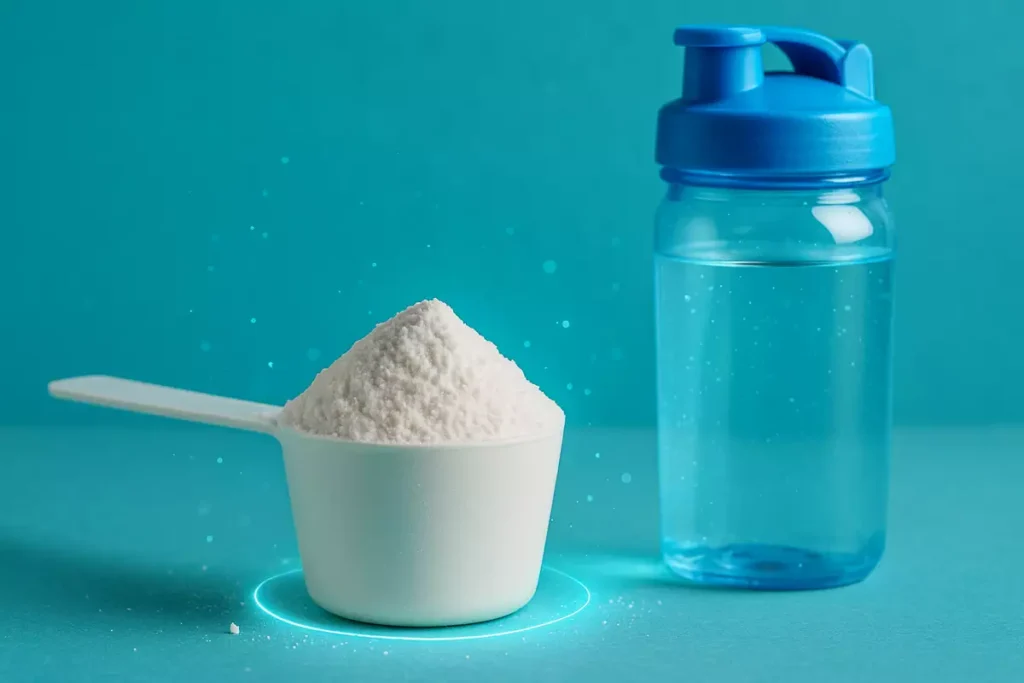Are you vegetarian or vegan and worried you’re missing out on creatine? You’re not alone.
Without meat or fish in your diet, your body naturally runs low on this powerful performance booster. That’s why creatine supplementation can be a true game-changer for plant-based athletes.
From explosive strength gains to faster recovery and even sharper focus, creatine offers benefits you don’t want to miss.
Table of contents
Quick Answer
If you’re vegetarian or vegan and wondering if creatine can help you—my short answer is yes, absolutely.
Plant-based athletes often benefit even more than meat eaters. Since plant foods don’t provide creatine, your muscles usually have lower baseline levels. That means supplementation can make a big difference in your energy, strength, and recovery.
What Is Creatine and How It Works

Creatine is a compound stored in your muscles that fuels short bursts of energy by supporting ATP production. Think of it as your body’s quick-access battery.
Meat and fish contain creatine naturally, but if you’re vegetarian or vegan, you’re likely running on a half-charged battery unless you supplement. For more details on how creatine supports athletic performance, check out creatine’s sprint performance benefits.
Why Vegetarians and Vegans May Benefit More
From my experience as a trainer, plant-based athletes often see bigger improvements once they start creatine.
Because their muscles start with lower creatine reserves, the “before and after” effect is usually more dramatic. One of my clients, Lucas, a vegan sprinter from Brazil, shaved noticeable time off his sprints after just six weeks of consistent use.
If you want to explore why vegan athletes respond so well, I recommend reading vegan creatine vs. monohydrate.
Benefits of Creatine Supplementation for Plant-Based Athletes

- Muscle Strength & Growth: I’ve personally felt stronger during heavy lifts. My legs could handle extra reps without that drained feeling.
- Faster Recovery: A vegetarian client, Maya from India, reported less soreness and more stamina when she added creatine. You can also check out the best creatine types for rapid muscle recovery.
- Cognitive Health: Research shows creatine also supports brain function. I noticed I felt sharper and more focused during intense training cycles.
Best Form and Dosage for Vegans
Stick with creatine monohydrate—it’s the gold standard.
I recommend 3–5 g daily. Personally, I skip the “loading phase” and go straight to a steady dose. It takes a few weeks, but the results are the same without digestive discomfort.
Some athletes explore other forms like creatine ethyl ester or liquid options, but I find monohydrate more reliable. For comparison, check out creatine ethyl ester vs. monohydrate and whether liquid creatine supplements are effective.
Possible Side Effects and Safety

Most people handle creatine well. I never had issues, but one of my clients, Elena from Spain, did experience mild bloating during a loading phase.
Once we switched to a smaller daily dose, the problem disappeared. Hydration is key—drink plenty of water and you’ll likely avoid side effects.
If bloating or cramps concern you, I suggest reading my guide on creatine monohydrate bloating and cramps.
Practical Tips for Vegetarians and Vegans
- Take creatine with a carb and protein source—like a smoothie with oats and pea protein. I personally enjoy it with a banana and almond milk shake post-workout.
- Be consistent. Creatine doesn’t work overnight—it builds up in your muscles over weeks. My client Jonas from Germany nearly gave up after two weeks but hit personal bests by week five.
- Don’t forget hydration. Creatine draws water into your muscles, so staying well-hydrated keeps everything balanced.
If you want to level up your supplement stack, combining creatine with EAAs can be a great pre-workout boost. Here’s my detailed breakdown: EAAs and creatine pre-workout combo.
Trainer’s Recommendation & Final Takeaway
If you’re vegetarian or vegan, creatine is one of the most effective, safest, and easiest supplements to add to your routine.
From my own lifts to clients’ performance breakthroughs, I’ve seen it deliver real, lasting results. It’s not magic—but paired with consistent training and a balanced diet, it can help you break plateaus, recover faster, and train with more confidence.
My advice? Give it a fair shot, stay consistent for at least a month, and track your progress. Chances are, you’ll be surprised by just how much stronger and sharper you feel.



Leave a Reply